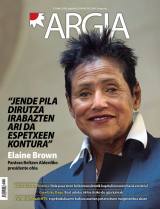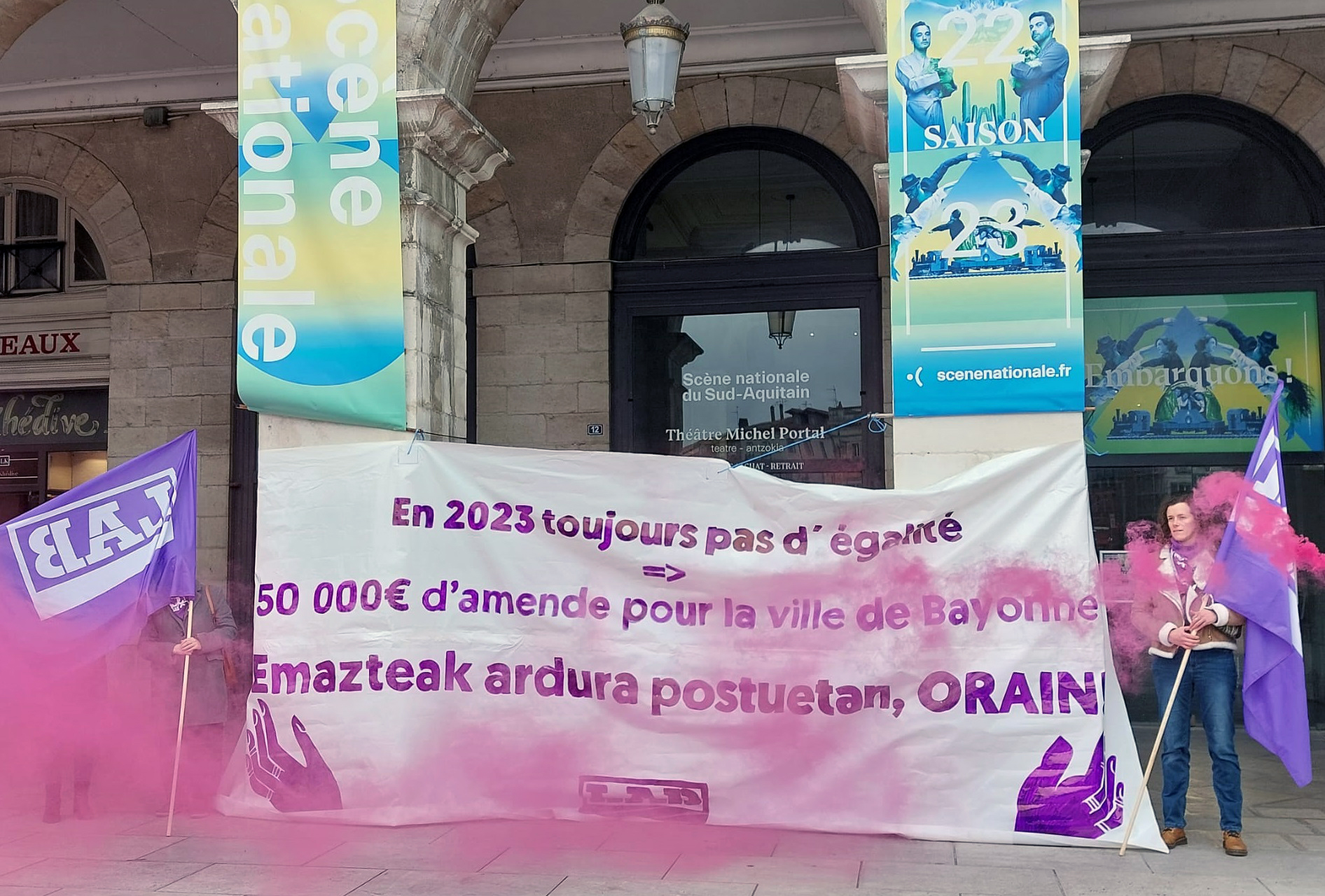Inverted mirror
A decade ago, in one of the first visits I made to Euskal Herria, I experienced an unusual situation or anecdote that I still remember with humor. It happened in a village in Gipuzkoa, where most of the population is Abertzale, I'm not going to give details about its name, I don't want to create unnecessary stigmas.
We entered a group of Catalans in one of the taverns of the town. Those present warned of our origin and the servant immediately asked us: “Well, are you coming to look for the stickers?” Laughter broke out. We laughed. We keep talking until late in the night.
It was another time then. The repression of the state was fierce, weapons and bombs were heard every day. On the other hand, in this corner of the northern Mediterranean, sovereignty did not manage to break the glass ceiling of the autonomism, the autonomism agreed for more than two decades with the regime of 1978.
We all know the admiration of some sectors of Catalan society for the courage and strength of the movement in the Basque Country. It has had to suffer the tragic consequences of the political conflict, it still has an outstanding conflict. At that time, it was often said that “the Catalan independentists tried to use various structures, methods and aesthetics practiced on the shores of the Gulf of Bizkaia”. In other words, the use of the concept of the “Basque mirror” was widespread.
As those young people who were around the bar told us, sometimes they were filled with people asking uncomfortable questions, like us, their people, curious about what was going on there, to gather and put into practice the lessons that could be useful around them. However, our self-esteem was weak, the checkmate we wanted to cast the king in some way was because of the miracle we had made of that community of men, and for various reasons we were delighted at the admiration we felt for those people we have as brothers, but nothing else.
In recent years, as a “déjà vu”, I have experienced a strange feeling that roles have been changing. The admired have become luxury spectators and the acolytes have stopped looking aside to take command of our history
In recent years, as a déjà vu, I've experienced a strange feeling that roles have been changing. The admired have become luxury spectators and the acolytes have refused to look aside to take the reins of our history. Seeing the Basque groups at the visit to get to know our projects has become commonplace, our tabernacles are interrogated with anxiety to know the essence of our strategies. This strange paradox puts us at a possible high level, but without being fully aware of how we have come here.
What do you want me to tell you? I believe there is no reason to believe that the situation has changed altogether. In other words, the power of the Basque People at the time was not inaccessible to us, and now you are not a defeated people, without any capacity to realize your yearning for freedom. Neither of them. Ten years ago we were not people without strong projects, that we were doing revolutionary tourism, that we would never become anyone, that we looked at you with envy, and now we are not some sort of vanguard, that you fight for over 60 years we will achieve it in two days.
Surely, we lack our own affection and affection and, above all, we lack some realism. Let our own bourgeoisies be left with the contests and betrayals that concern them, even on the day that we run our republics, they will deny us the utopia of having achieved that end. Our paths go beyond national liberation, which alone will not bring the social transformation we dream of. We share the road and let each people pull on one side, so the stake will end up falling.
Bidali zure iritzi artikuluak iritzia@argia.eus helbide elektronikora
ARGIAk ez du zertan bat etorri artikuluen edukiarekin. Idatzien gehienezko luzera 4.500 karakterekoa da (espazioak barne). Idazkera aldetik gutxieneko zuzentasun bat beharrezkoa da: batetik, ARGIAk ezin du hartu zuzenketa sakona egiteko lanik; bestetik, egitekotan edukia nahi gabe aldatzeko arriskua dago. ARGIAk azaleko zuzenketak edo moldaketak egingo dizkie artikuluei, behar izanez gero.
Ukrainako gudaren amaierak ondorio sakonak ekarriko ditu Europa osora. Europako elite ekonomikoek beren indar guztia jarri dute guda-zelaian eta galdu egin dute. Galtzaileek, elite globalistek, beren egitasmo kuttuna galduko dute, Europako Batasuna, eta Bruselatik europar... [+]
Azterketak amaitzearekin batera ohikoak bihurtu dira ikasleriaren artean, urteko garai honetan merkeak diren hegaldiak hartu eta adiskideekin bidaiatzea. Horrela egin dut neuk ere eta Londresera joateko aukera izan dut. Ildo beretik, bertan “euskaldun” pilarekin egin... [+]
Ez dakit nondik hasi, egia esan. Ordezkoa naizen heinean –irakaskuntzan ikasturte gutxi batzuk daramatzat lanean– eskola ugari ezagutu ditut Nafarroa, Bizkai eta Araban zehar. Lankide izan ditudan irakasleekin euskal eskolak dituen gabezien inguruan hitz egiten... [+]
Alberto Martinez Eusko Jaurlaritzako Osasun sailburuak argi dio: ez ditu mediku euskaldunak aurkitzen, eta euskarazko osasun arreta ezin da bermatu mediku egoiliar (formazioan dauden espezialista) gehienak kanpotarrak direlako. Mediku euskaldunak bilatzea perretxikotan joatea... [+]
“Gogo eta gorputzaren zilbor-hesteak: bi kate. Bi kate, biak ebaki beharrezkoak: bat gorputzaren bizitzeko, bestea gogoaren askatzeko”. Hala dio Mikel Laboaren kantak; hala izan da belaunaldiz belaunaldi, egun arte.
Gogoan dut nire gurasoak askotan joaten zirela... [+]
Otsailean bost urte bete dira Iruña-Veleiako epaiketatik, baina oraindik hainbat pasarte ezezagunak dira.
11 urteko gurutze-bidea. Arabako Foru Aldundiak (AFA) kereila jarri zuenetik epaiketa burutzera 11 urte luze pasa ziren. Luzatzen den justizia ez dela justizia, dio... [+]
MAITE: (biharko eguna antolatzen bere buruaren baitan) Jaiki, gosaldu, bazkaria prestatu, arropa garbitu, etxea garbitu, gizon hori jaiki, seme-alabak jaiki, hiru horien gosaria prestatu, haiek agurtu, erosketak egin, lanera joan, seme-alabak eskolatik jaso, merienda eman,... [+]
Matxismoa normalizatzen ari da, eskuin muturreko alderdien nahiz sare sozialetako pertsonaien eskutik, ideia matxistak zabaltzen eta egonkortzen ari baitira gizarte osoan. Egoera larria da, eta are larriagoa izan daiteke, ideia zein jarrera matxistei eta erreakzionarioei ateak... [+]
“Kasu, ez gitxu lo!”. Gure denbora eta manerekin baina heldu gira.
Azaroaren 25ean Baionako elgarretaratzera joan ez joan eta autoak nola partekatu pentsatzetik (joan-jina bi oren), bat-batean Lartzabalen elgarretaratze bat antolatu genuen, eta 47 emazte bildu!... [+]
Nahiz eta Nazio Batuen Erakundeak (NBE) 1977an nazioarteko egun bat bezala deklaratu zuen eta haren jatorriaren hipotesi ezberdinak diren, Martxoaren 8aren iturria berez emazte langileen mugimenduari lotua da.
Aurrekoan, ustezko ezkertiar bati entzun nion esaten Euskal Herrian dagoeneko populazioaren %20 atzerritarra zela. Eta horrek euskal nortasuna, hizkuntza eta kultura arriskuan jartzen zituela. Azpimarratzen zuen migrazio masifikatua zela arazoa, masifikazioak zailtzen baitu... [+]
Ez dut beti ulertzen nola aritzen ahal diren lur planeta honetako zati okitu, zuri, gizakoi eta kapitalistako aho zabal mediatikoak, beraiena, hots, gurea, zibilizazioa dela espantuka. Berriak irakurtzen baldin baditugu, alta, aise ohartuko gara, jendetasuna baino, barbaria dela... [+]
Administrazioko hainbat gai, LGTBI+ kolektiboko kideen beharrizanak, segurtasun subjektiboa, klima aldaketa, gentrifikazioa, ikus-entzunezkoak erabiltzeko modu berriak, audientzia-datuak jasotzeko moduak, dislexia, ikuspegi pedagogiko aktibo eta irisgarriak, literatur... [+]
Auzitan jar ez daitekeen baieztapen orokor eta eztabaidaezinaren gisan saldu digute hizkuntzak jakitea printzipioz ona dela, baina baditu bere "ñabardurak", edo esanahi ezkutuagokoak. Hemengo ustezko elebitasun kontzeptuaren azpian dagoen baina kamuflatzen den... [+]
Otzandu egin gara, katalanak eta euskaldunok, ekaitzaren ondoren. Saiatu ginen, bai; sendo ekin genion, eta gogor kolpatu gaituzte; ezin izan genien gure helburu zuzen, ezinbesteko, sakratuei eutsi. Eta porrotaren mingostasuna dastatu dugu, eta bigundu egin gara irabazleen... [+]
















